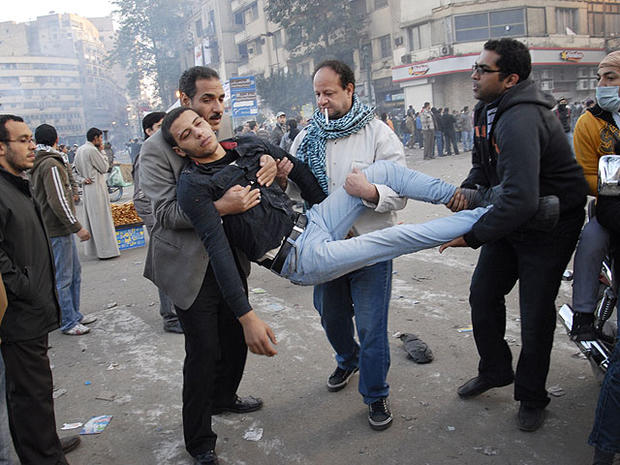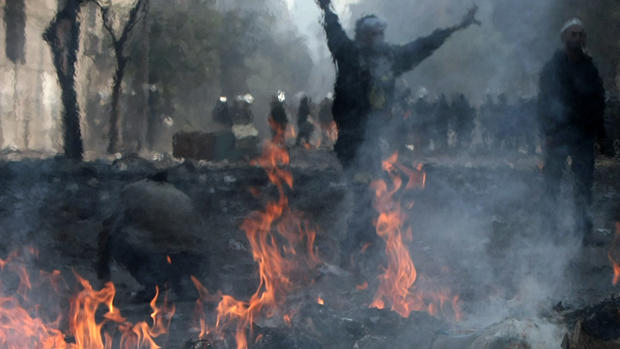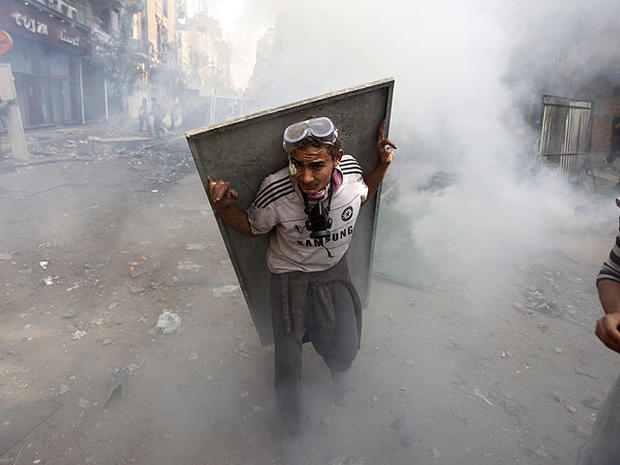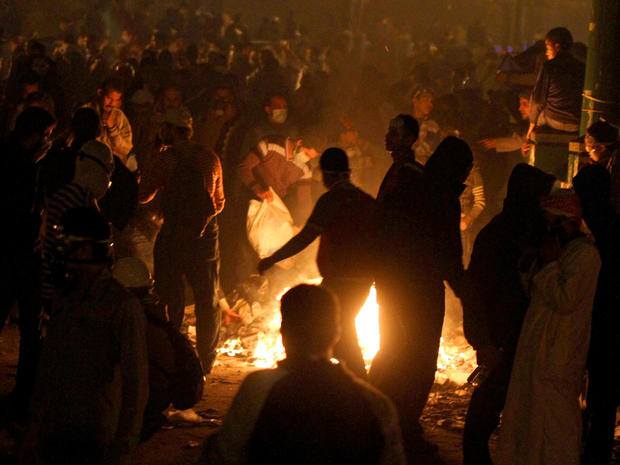Cairo clashes continue; World pressure mounts
Last updated 6:00 p.m. ET
CAIRO - International criticism of Egypt's military rulers mounted Wednesday as police clashed for a fifth day with protesters demanding the generals relinquish power immediately.
A rights group raised the death toll for the wave of violence to at least 38. At least 2,000 protesters have been wounded, mostly from gas inhalation or injuries caused by rubber bullets fired by the army and the police.
The United Nations strongly condemned authorities for what it deemed an excessive use of force. Germany, one of Egypt's top trading partners, called for a quick transfer of power to a civilian government. The United States and the U.N. secretary general have already expressed their concern over the use of violence against mostly peaceful protesters.
Navi Pillay, the U.N. High Commissioner for Human Rights, deplored the role of Egypt's security forces in attempting to suppress protesters.
"Some of the images coming out of Tahrir, including the brutal beating of already subdued protesters, are deeply shocking, as are the reports of unarmed protesters being shot in the head," Pillay said. "There should be a prompt, impartial and independent investigation, and accountability for those found responsible for the abuses that have taken place should be ensured."
Pillay said the actions of the military and police are enflaming the situation, prompting more people to join the protests.
"The more they see fellow protesters being carted away in ambulances, the more determined and energized they become."
Clashes resumed for a fifth day despite a promise by the head of the ruling military council on Tuesday to speed up a presidential election to the first half of next year, a concession swiftly rejected by tens of thousands of protesters in Tahrir Square. The military previously floated late next year or early 2013 as the likely date for the vote, the last step in the process of transferring power to a civilian government.
Dad: U.S. student denies Cairo firebomb, not hurt
U.S. journalist arrested by Egyptian police
Complete coverage: Anger in the Arab World
In the coastal city of Alexandria, Egypt's army put an end to clashes after taking control of an area where confrontations between security forces and protesters were rife. Army personnel and military police cordoned off the street and put barbed wire around the area.
"No one in the square really considers anything that the military suggested yesterday as a concession. We have a very clear demand, which is that the military steps down ... immediately," Khalid Abdalla, an activist and actor, told "The Early Show" Wednesday. "It is unacceptable that the military tries to be above the law, above its citizens, above the constitution, that it tortures, that kills. We do not recognize their authority anymore, and we're asking them to leave immediately."
The clashes are the longest spate of uninterrupted violence since the 18-day uprising that toppled the former regime in February.
The standoff at Tahrir and in other major cities such as Alexandria and Assiut has deepened the country's economic and security crisis less than a week before the first parliamentary elections since the ouster of longtime authoritarian leader Hosni Mubarak.
Field Marshal Hussein Tantawi tried to defuse tensions with his address late Tuesday, but he did not set a date for handing authority to a civilian government.
The Tahrir crowd, along with protesters in a string of other cities, want Tantawi to step down immediately in favor of an interim civilian administration to run the nation's affairs until a new parliament and president are elected.
"I think that's very realistic because there's a simple power of balance here right now. Either they massacre us all, including me, or they decide to step down. Now, if they're up to a massacre, that's going to take them down, and if they're not up to a massacre then they'll go down anyway, so as far as I'm concerned it's really a matter of time because we have the conscience of the country on our side," Abdalla said.
The government offered more concessions on Wednesday, ordering the release of 312 protesters detained over the past days and instructing civilian prosecutors to take over a probe the military started into the death of 27 people, mostly Christians, in a protest on Oct. 9. The army is accused of involvement in the killings.
The military also denied that its troops around Tahrir Square used tear gas or fired at protesters, an assertion that runs against numerous witness accounts that say troops deployed outside the Interior Ministry were firing tear gas at protesters.
Abdalla claimed that the tear gas came from the U.S.
"The tear gas, which is clinging to my lungs, which was bombed in the square last night, is from stocks that have been replenished over the last nine months. Every canister says that it's come from the U.S., and that's something that causes me, you know, great sadness."
Abdalla's claims about the tear gas canisters could not be independently confirmed.
The U.S. has also viewed protest crackdown warily. White House spokesman Jay Carney said Tuesday the administration was deeply concerned about the violence and is calling for restraint on all sides. He said despite the clashes between security forces and protesters, Egypt must proceed with a timely transition to democracy.
Street battles have been heaviest around the heavily fortified Interior Ministry, located on a side street that leads to the iconic square that was the epicenter of the uprising earlier this year. Police and army troops are using tear gas and rubber bullets to keep the protesters from storming the ministry, a sprawling complex that has for long been associated with the hated police and Mubarak's former regime.
The protesters, who have withstood tear gas and beatings, say they do not want to storm the ministry but are trying to keep the police and army from moving on nearby Tahrir Square.
An Associated Press reporter at the scene said a truce negotiated by Muslim clerics appeared to be holding in the late afternoon, with both the protesters and the police pulling back from the front line street, scene of most of the fighting. State television, meanwhile, broadcast footage from the scene of the clashes showing army soldiers forming a human chain between the protesters and the police in a bid to stop the violence.
A short while earlier, tension was high in the area on the side streets leading to the Interior Ministry, which is responsible for the police, with many young protesters vomiting and coughing incessantly from the tear gas fired by the police. Others wounded by rubber bullets were hurriedly ferried by motorcycle to field hospitals.
Elnadeem Center, an Egyptian rights group known for its careful research of victims of police violence, said late Tuesday that the number of protesters killed in clashes nationwide since Saturday is 38, three more than the Health Ministry's death toll, which went up to 35 on Wednesday. All but four of the deaths were in Cairo.
The clashes also have left at least 2,000 protesters wounded, mostly from gas inhalation or injuries caused by rubber bullets fired by the army and the police. The police deny using live ammunition.
Shady el-Nagar, a doctor in one of Tahrir's field hospitals, said three bodies arrived in the facility on Wednesday. All three had bullet wounds.
"We don't know if these were caused by live ammunition or pellets because pellets can be deadly when fired from a short distance," he said.
The turmoil broke out just days before the start of staggered parliamentary elections on Nov. 28. The votes will take place over months and conclude in March.
The Muslim Brotherhood, Egypt's strongest and best organized group, is not taking part in the ongoing protests in a move that is widely interpreted to be a reflection of its desire not to do anything that could derail the election, which it hopes win along with its allies.
Hundreds of Brotherhood supporters, however, have defied the leadership and joined the crowds in the square. Their participation is not likely to influence the Brotherhood's leadership or narrow the rift between the Islamist group and the secular organizations behind the uprising that toppled Mubarak and which are behind the latest spate of protests.
Sixty years after it was banned, the Brotherhood found itself empowered in the wake of the Feb. 11 ouster of Mubarak. It moved swiftly after the overthrow of Mubarak to form its own party, Freedom and Justice, to contest the parliamentary election.
Notorious for its political opportunism, the Brotherhood and its allies are hoping to win enough seats in the next legislature to push through a new constitution with an Islamic slant and bring this mainly Muslim nation of some 85 million people closer to being an Islamic state.
German Chancellor Angela Merkel, meanwhile, was said by a spokesman to be following events in Egypt "with great concern."
"In the new Egypt, which wants to be free and democratic, repression and the use of force against peaceful demonstrators can have no place," spokesman Steffen Seibert said in Berlin. "The demonstrators' demands ... for a quick transition to a civilian government are understandable from the German government's point of view," he added.




